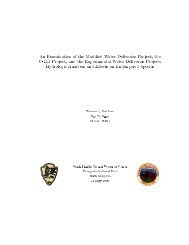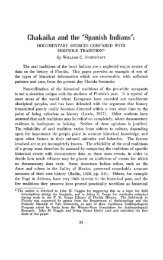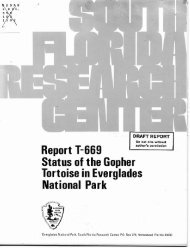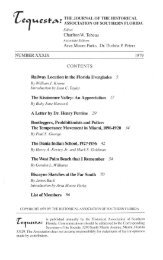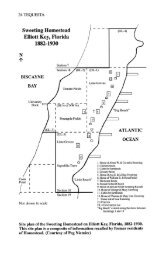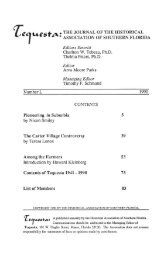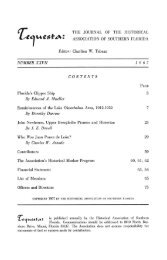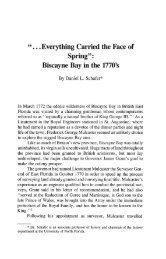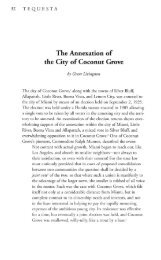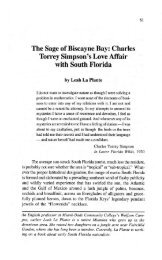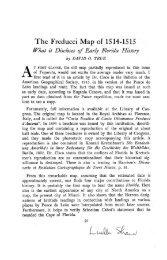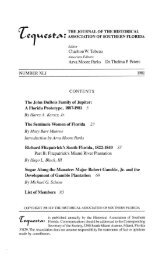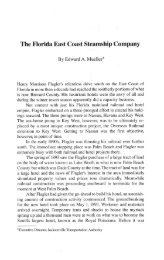Miami During the Civil War - FIU Digital Collections
Miami During the Civil War - FIU Digital Collections
Miami During the Civil War - FIU Digital Collections
You also want an ePaper? Increase the reach of your titles
YUMPU automatically turns print PDFs into web optimized ePapers that Google loves.
<strong>Miami</strong> <strong>During</strong> <strong>the</strong> <strong>Civil</strong> <strong>War</strong> 57<br />
Butler where he died. He had served as a hospital stewart. 83 George<br />
Lewis, who Rose Wagner revered, never returned to <strong>Miami</strong>. Those<br />
who knew him believed he had been shipwrecked. Benjamin Tiner,<br />
Lewis' former slave, lived with <strong>the</strong> Wagners until his death in 1869.<br />
Lewis' nephew left home during <strong>the</strong> war and moved to <strong>the</strong> west coast<br />
of Florida. The Frow family returned to Key Biscayne after <strong>the</strong> war.<br />
Simeon's son Joe, his bro<strong>the</strong>r, John, and <strong>the</strong>ir families operated <strong>the</strong><br />
lighthouse during its final dozen years as an active beacon. They<br />
settled permanently in Coconut Grove. 84<br />
At least those who chose to stay in <strong>the</strong> <strong>Miami</strong> area escaped <strong>the</strong><br />
deadly outbreaks of yellow fever that frequently devastated <strong>the</strong> Key<br />
West population. A major epidemic struck Key West in July 1864.<br />
General Woodbury was one of many who contracted <strong>the</strong> disease. He<br />
died on Aug. 16, 1864. 85<br />
A common struggle for survival brought both <strong>the</strong> old timers and<br />
<strong>the</strong> new refugees toge<strong>the</strong>r. William Wagner epitomized <strong>the</strong> neutrality<br />
that characterized <strong>Miami</strong>. The dangers and tragedies brought out <strong>the</strong><br />
best in some pioneers. Michael Sears, John Adams, William Wagner,<br />
George Lewis, and o<strong>the</strong>rs showed courage and risked everything for<br />
<strong>the</strong>ir families, friends, and <strong>the</strong>ir country.<br />
Endnotes<br />
1. The name "<strong>Miami</strong>" was in use during 1861-65. The U.S.<br />
Navy used <strong>the</strong> name "Little <strong>Miami</strong>." See <strong>the</strong> naval records cited<br />
below. Mrs. Adam C. Richards, maiden name Rose Wagner, whose<br />
personal account is <strong>the</strong> primary source for <strong>the</strong> period, uses <strong>the</strong> name<br />
for <strong>the</strong> area near <strong>the</strong> mouth of <strong>the</strong> <strong>Miami</strong> River. She also reported<br />
that <strong>the</strong> Post Office was called <strong>Miami</strong>. See Mrs. Adam C. Richards,<br />
"Reminiscences of <strong>the</strong> Early Days of <strong>Miami</strong>," The <strong>Miami</strong> News, Oct<br />
1903, newspaper clipping collection, vol. 3, Agnew Welsh Notebook<br />
36, Florida Room, <strong>Miami</strong> Public Library, <strong>Miami</strong>, Florida (hereafter<br />
Richards, "Reminiscences"). Page numbers, which are difficult to<br />
identify due to <strong>the</strong>ir illegibility and <strong>the</strong> disorganization of <strong>the</strong> clipping<br />
file, are not included in <strong>the</strong> footnotes.<br />
2. Jeanne Bellamy, "The Everglades National Park Unlike Anything<br />
Else in <strong>the</strong> World," The Florida Handbook 5th ed. (Tallahassee:<br />
The Peninsular Publishing Co., 1955), 43.<br />
3. U.S. Department of Commerce, Bureau of <strong>the</strong> Census, Fifteenth<br />
Census of <strong>the</strong> United States (Washington: Government Print-



